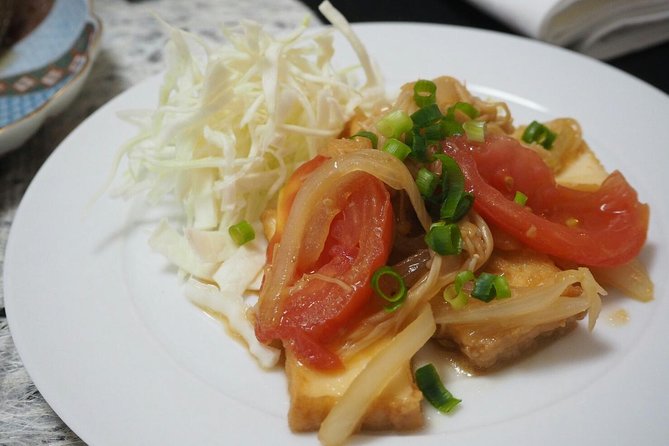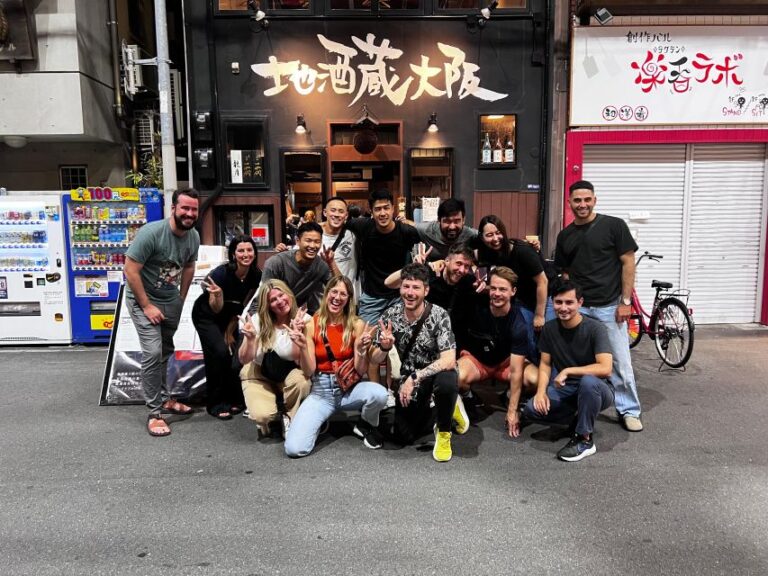Here, readers will discover a unique opportunity for vegans to learn traditional Japanese cooking techniques and recipes in a specially designed class. Operated by Miwa’s Japanese cooking class, a renowned organization known for its expertise in Japanese cuisine, participants can expect a hands-on experience guided by skilled instructors.
From sushi rolls and miso soup to tempura and tofu-based dishes, this class offers a rewarding and enlightening experience for both seasoned vegans and those curious about plant-based cooking.
Quick Takeaways

- The Japanese Cooking Class for Vegans offers a hands-on experience guided by skilled instructors.
- The class focuses on using authentic ingredients and techniques to create delicious vegan dishes.
- Japanese cuisine is beneficial for vegans due to its emphasis on fresh, seasonal ingredients and abundance of vegetables.
- Traditional vegan dishes in Japanese cooking include vegetable tempura, miso soup, sushi rolls, gyoza, and yakisoba.
Overview of the Japanese Cooking Class
Offered by Miwa’s Japanese cooking class, the Japanese Cooking Class for Vegans provides a rundown of vegan-friendly Japanese cuisine.
This class is perfect for those who follow a vegan lifestyle but still want to enjoy the flavors and techniques of traditional Japanese cooking.
Students will learn how to create delicious vegan dishes using authentic ingredients and cooking methods.
From sushi rolls filled with fresh vegetables to hearty miso soup made with plant-based broth, you will discover the wide range of vegan options available in Japanese cuisine.
The class is taught by experienced instructors who are passionate about sharing their knowledge and love for vegan Japanese cuisine.
Students will leave the class with a deeper understanding of vegan cooking techniques and the ability to recreate these mouthwatering dishes at home.
Here's some other great tours and experiences that we think you'll like.
Benefits of Japanese Cuisine for Vegans

Japanese cuisine offers a variety of benefits for vegans seeking delicious and nutritious plant-based meals. With its emphasis on fresh, seasonal ingredients, Japanese cooking provides a wide range of vegan alternatives that are both satisfying and packed with health benefits.
From the abundance of vegetables used in dishes like vegetable tempura and stir-fried greens, to the protein-rich tofu and edamame, Japanese cuisine offers a wealth of options for those following a vegan diet. Plus, the traditional cooking methods used in Japanese cuisine, such as steaming and grilling, help to retain the natural flavors and nutrients of the ingredients.
Whether you’re looking for a light and refreshing meal or a hearty and filling dish, Japanese cuisine provides a wealth of tasty and nutritious options for vegans.
Traditional Vegan Dishes in Japanese Cooking

Traditional vegan dishes in Japanese cooking showcase the diverse array of plant-based options available in this culinary tradition. With a focus on fresh and seasonal ingredients, these dishes highlight the natural flavors and textures of vegan Japanese ingredients.
Here are five examples of traditional vegan dishes that demonstrate the creativity and skill of Japanese chefs:
-
Vegetable Tempura: Light and crispy, this dish features a colorful assortment of battered and deep-fried vegetables.
-
Miso Soup: A staple in Japanese cuisine, this soup combines fermented soybean paste with a variety of vegetables and tofu for a savory and comforting taste.
-
Sushi Rolls: Vegan sushi rolls, known as makizushi, are filled with a combination of vegetables, pickles, and sometimes tofu or mushrooms, wrapped in seaweed and rice.
-
Gyoza: These pan-fried dumplings are typically filled with minced vegetables and tofu, seasoned with soy sauce and other vegan-friendly seasonings.
-
Yakisoba: This stir-fried noodle dish often includes a medley of vegetables, such as cabbage, carrots, and bean sprouts, cooked with vegan-friendly soy-based sauce.
Through the use of vegan cooking techniques, such as grilling, steaming, and stir-frying, Japanese cuisine offers an abundance of delicious and satisfying plant-based options for vegans to enjoy.
Ingredients and Techniques Used in the Class
.jpg)
The cooking class utilizes a variety of essential ingredients and techniques to create vegan Japanese dishes. Participants will learn about vegan cooking techniques that are commonly used in Japanese cuisine, such as stir-frying, steaming, and grilling. These techniques help to bring out the natural flavors of the ingredients and create dishes that are both delicious and nutritious.
In terms of ingredients, the class focuses on using popular vegan ingredients that are commonly found in Japanese cooking. These include tofu, seaweed, mushrooms, and various vegetables such as daikon radish, kabocha squash, and eggplant. These ingredients aren’t only flavorful, but also provide essential nutrients and add depth to the dishes.
Throughout the class, the instructor will demonstrate how to properly handle and prepare these ingredients, as well as provide tips and tricks to enhance the flavors of the dishes. By the end of the class, you will have gained a deeper understanding of the ingredients and techniques used in vegan Japanese cooking, and be able to recreate these dishes at home.
Tips for Creating Vegan Variations of Japanese Recipes
.jpg)
One key tip for creating vegan variations of Japanese recipes is to experiment with different plant-based ingredients and seasonings. Here are some tips to help you create delicious vegan versions of your favorite Japanese dishes:
-
Use tofu as a substitute for meat or fish. Tofu is versatile and can be grilled, stir-fried, or used in soups and stews.
-
Replace fish-based dashi with kombu (kelp) or shiitake mushroom dashi for a rich umami flavor.
-
Opt for soy sauce or tamari instead of fish sauce to add depth of flavor to your dishes.
-
Make your own vegan sushi by using avocado, cucumber, and pickled vegetables as fillings.
-
Stock up on staple ingredients like miso paste, mirin, and rice vinegar to create authentic Japanese flavors in your vegan dishes.
Testimonials From Vegan Participants in the Cooking Class
.jpg)
Participants in the Japanese Cooking Class for Vegans have shared their positive experiences and feedback about the class. They praised the class for its focus on vegan cooking techniques and the use of vegan-friendly Japanese ingredients.
One participant mentioned how the class provided a unique opportunity to learn about traditional Japanese cuisine while adhering to their vegan lifestyle. They were particularly impressed with the instructor’s knowledge and expertise in adapting traditional recipes to suit vegan preferences.
Another participant highlighted the hands-on nature of the class, which allowed them to actively participate in preparing a variety of delicious vegan dishes.
Here's some more great Japan experiences nearby that we think you'll like.
Frequently Asked Questions
.jpg)
Is the Japanese Cooking Class Suitable for Beginners or Do I Need Prior Cooking Experience?
Taking a cooking class as a beginner is beneficial, as it provides hands-on experience and guidance. Prior cooking experience is not required. To make the most out of your cooking class, come with an open mind and willingness to learn.
Can I Request Specific Vegan Dishes to Be Taught in the Cooking Class?
Yes, participants can request specific vegan dishes to be taught in the cooking class. The instructors at Miwa’s Japanese cooking class prioritize cultural diversity, ensuring that all dietary preferences are accommodated.
Are the Ingredients Used in the Class Easily Accessible Outside of Japan?
Yes, the ingredients used in the class are easily accessible outside of Japan. The instructor will also provide tips on finding vegan substitutes for certain ingredients, ensuring that participants can recreate the dishes at home.
What Kind of Techniques Will Be Taught in the Cooking Class?
The cooking class will teach various vegan cooking techniques, as well as provide tips for veganizing Japanese recipes. Participants will learn how to create delicious plant-based dishes with authentic Japanese flavors.
Are There Any Specific Tips for Creating Vegan Variations of Traditional Japanese Recipes?
For creating vegan variations of traditional Japanese recipes, there are specific tips to consider. Vegan substitutions can be made for ingredients like fish sauce or dashi stock, using alternatives like soy sauce or kombu.
The Sum Up
.jpg)
To sum it up, the Japanese cooking class for vegans offers a unique and hands-on experience for individuals looking to learn traditional Japanese cooking techniques and recipes that align with their dietary preferences.
With skilled instructors and a focus on using fresh, locally-sourced ingredients, participants can expect to gain new cooking skills and a deeper understanding of Japanese culinary culture.
Whether you’re a seasoned vegan or simply curious about plant-based cooking, this class is sure to be a rewarding and enlightening experience.






